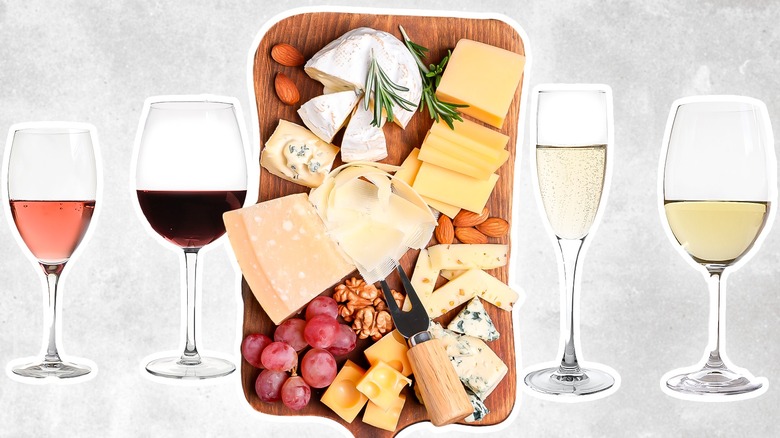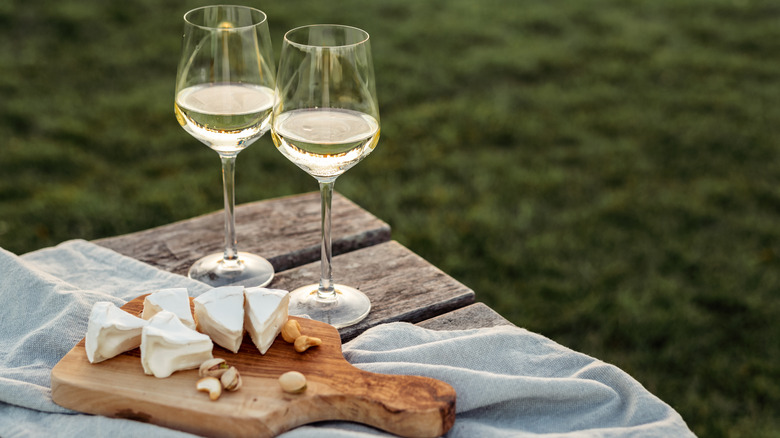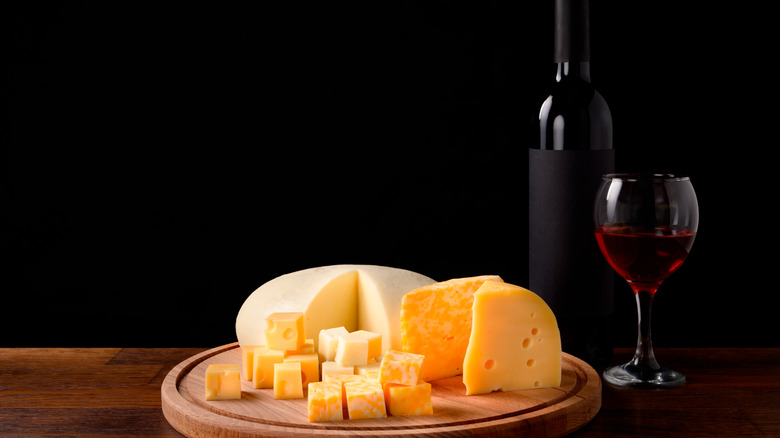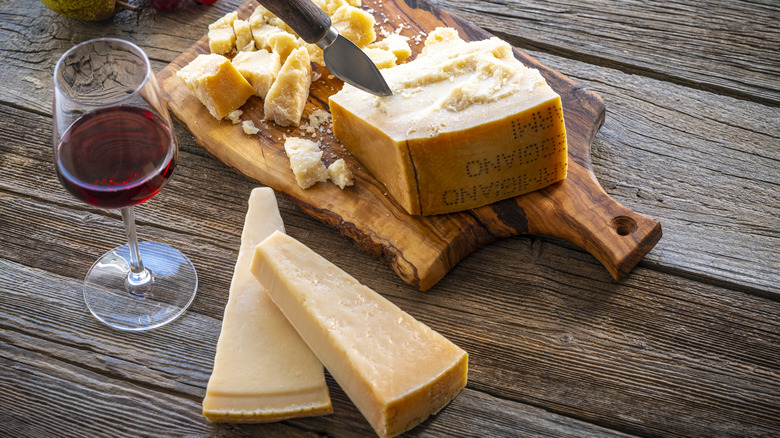The Ideal Wines To Pair With A Cheese Board
No snack starts a party quite like the ultimate cheese board. Grab your nicest cheese plate, crunchy crackers, a variety of cheeses, and some spicy and sweet condiments for a party-ready platter. Finally, pop open a bottle of wine to pair perfectly with your selections.
But what is the ideal wine and food pairing for a cheese board? When you make the right combination, each element should bring out the best qualities in the other. A general rule of thumb is sweet and umami foods make wines taste more drying, bitter, and acidic, and less sweet and fruity. In comparison, salty and acidic foods will make wines taste less drying, bitter, and acidic and more sweet and fruity. When it comes to cheese, it's best to choose a high-acid wine to cut through some of the fat, and then pick a bottle based on the style of cheese you're serving.
I chose these wine and cheese pairings based on my own experience as a former editor at a wine magazine with a level two Wine and Spirits Education Trust certification. These wines are personal favorites and crowd-pleasers for any kind of wine drinker, and they pair well with most cheeses. It's important to remember that although there are general rules, wine pairings are subjective. Everyone has different tastebuds, likes, and dislikes.
Sancerre with soft cheese
Pairing cheese and wine is all about balancing flavors, so a bright and acidic wine is the perfect match for a soft cheese that is decadent and creamy like Brie or Camembert. Many creamy cheeses bring some herbaceous qualities and zest, so pick a wine that can match those flavors, too. That's why I love Sauvignon Blanc and especially Sancerre.
You can find bottles of Sauvignon Blanc from all corners of the wine-growing world — France, New Zealand, Chile, California, South Africa, and more. But the Loire Valley makes arguably some of the most crisp Sauvignon Blanc out there. Sancerre is one of the many wine appellations in the Loire Valley, and it's a beautiful pairing for most cheeses, but especially a soft cheese. Sancerre has a high acid content, a light body, and fresh herbaceous and floral flavors with hints of refreshing lemon and green apple.
Though it's not a set-in-stone rule, often what grows together goes together. That means if you want other options, stick with high-acid French wines that will likely pair beautifully with these heavy, French cheeses. Try a crisp, un-oaked Chardonnay, like Chablis, or a dry Champagne to help break down some of the fat from the cheese that can coat your tongue.
Pinot Noir with semi-soft cheese
The best wines to pair with Colby, Havarti, or other semi-soft cheeses, should match with the tangy, nutty, and mild flavors of the cheese. Pinot Noir tends to have high acid to help cut through fat; low tannins that won't overpower a milder cheese; and fruity flavors like red cherries, strawberries, and raspberries that work well here. Some funkier Pinot Noirs also carry hints of mushrooms, which can make for a nice pairing.
Milder cheese should pair with un-oaked Pinot Noir from a cooler climate, like Burgundy or Oregon. These are often simpler and fresher wines, and can be even more fruity and acidic. Pinot Noir with some age from a moderate climate, like South Africa, New Zealand, California, Australia, or Chile, can have a little more complexity and stands up well to a cheese with a little more age, too. You can also pair semi-soft cheeses with a lightly oaked Chardonnay if you are looking for a white wine option.
Sangiovese with hard cheese
Hard cheeses like various ages of Parmigiano Reggiano or Pecorino Romano tend to have grassy and salty flavors that can handle higher tannins and complex flavors. Any bold red with a good amount of acid goes well here to cut through the high fat of the cheese and stand up to its intensity.
Sangiovese is a great option because it's a high-tannin and high-acid red wine with delicious rustic flavors of red cherries, plums, and dried herbs. It's grown almost exclusively in Italy and is often blended with other local varieties. Another common name for Sangiovese is Chianti, which refers to the wine-growing region in central Tuscany known for very high-quality wines.
If you're cutting into a hard Italian cheese, a bold Italian wine is the obvious pick. After all, it's a common wine to pour when digging into cheesy pizza and pasta dishes. That said, a Cabernet Sauvignon or Syrah will work here as well if you want other options.



